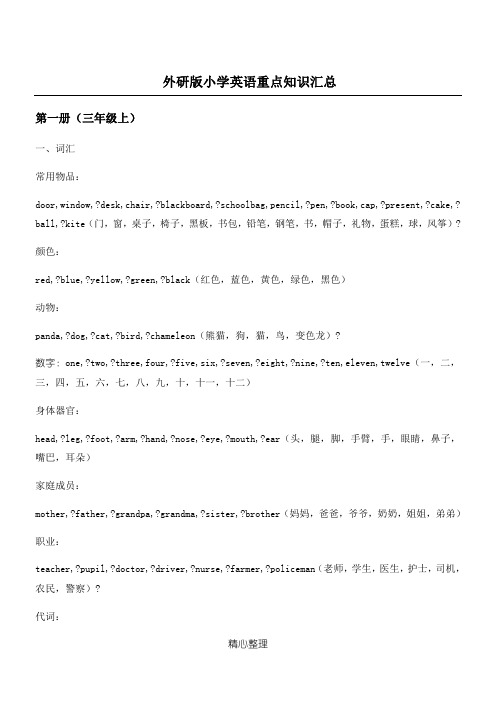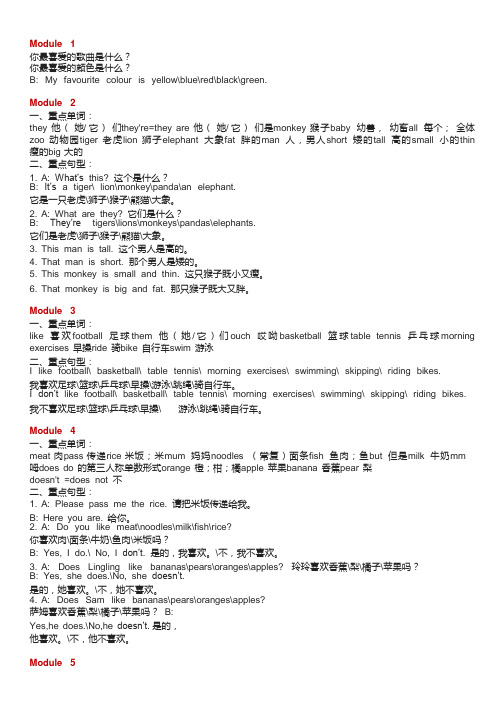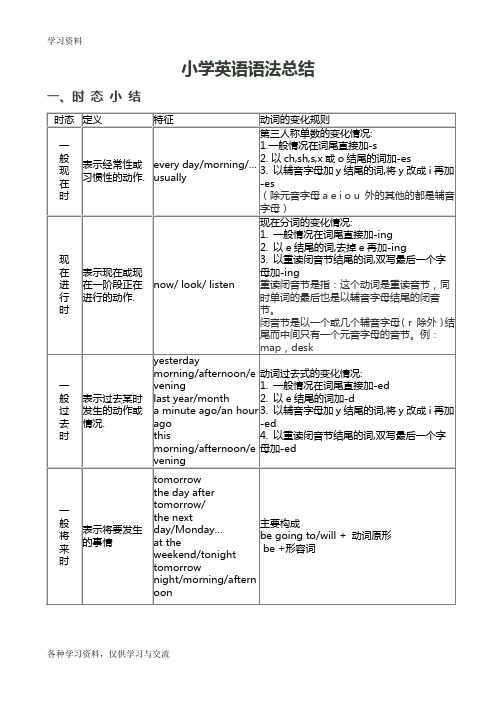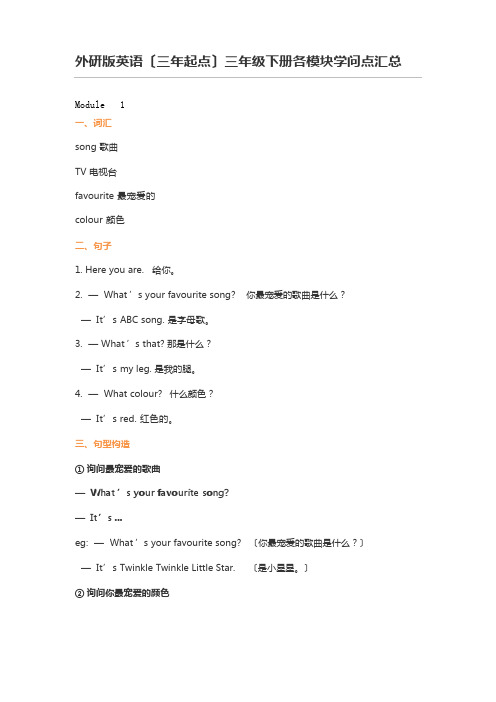外研版(三年级起点)版小学三年级下册英语知识点归纳
外研版(三年级起点)小学英语总复习资料

外研版小学英语重点知识汇总第一册(三年级上)一、词汇常用物品:风筝)? 颜色:动物:数字:mother,?father,?grandpa,?grandma,?sister,?brother(妈妈,爸爸,爷爷,奶奶,姐姐,弟弟)职业:teacher,?pupil,?doctor,?driver,?nurse,?farmer,?policeman(老师,学生,医生,护士,司机,农民,警察)?代词:I,?you,?it,?me,?he,?she,?your,?my,?his,?her,?this,?that(我,你,它,我,他,她,你的,我的,他的,她的,这个,那个)?二、句型?1、打招呼及问好:Hello!(你好)??Hi!(你好)Byebye.Thanks!----I’m?fine,?thank?you.(我很好,谢谢你。
)祝别人生日快乐说:Happy?birthday!?(生日快乐!)给别人东西时说:Here’s?your?present.?(给你的礼物。
)2、询问姓名:----What’s?your?name??----I’m?+姓名。
例句:----I’3It’It’例句:It’It’4How?many?+(名词复数)?例句:----How?many?boys??(多少个男孩?)----Twelve?boys.(12个男孩。
)----How?many?red?caps??(多少顶红色的帽子?)----One?red?cap.?(一顶红色的帽子)5、询问年龄:----How?old?are?you??----I’m?+年龄例句:----I’6----It例句:----It----It7This?is?my?+?物/人。
例句:This?is?my?school.(这是我的学校。
)That?is?my?classroom.(那是我的教室。
)This?is?my?English?teacher.?(这是我的英语老师。
外研版三年级英语下册全册知识要点综合复习资料

外研版三年级英语下册全册知识要点综合复习资料外研版三年级英语下册全册知识要点综合复习资料【 Module 1 】1. -What ’ s your favourite colour ?你最喜欢的颜色是什么?-My favourite colour is yellow. 我最喜欢的颜色是黄色。
colour 颜色 :(red 、 blue 、black 、 white 、 green 、 orange 、 brown)2. -What ’ s your favourite song? 你最喜欢的歌曲是什么?-It ’ s the ABC song. 是字母歌。
3. -Here you are. 给你。
-Thank you. 谢谢。
【 Module 2 】1. -What ’ s this? 这是什么? -It ’ s a tiger . 这是一只老虎。
animal 动物 :(monkey 、 lion 、 panda 、 an elephant 、 cat 、 dog)2. -What are they ?它们是什么? -They ’ re tigers . 它们是老虎。
(monkeys 、lions 、 pandas 、 elephants)3. That man is short. 那个男人很矮。
It is big and tall . 它又大又高。
(tall 、 short 、 big 、 small 、fat 、 thin)【 Module 3 】1. I like football . 我喜欢足球。
sport 运动:(morning exercises 、 table tennis 、basketball)I don ’ t like football . 我不喜欢足球。
sport 运动 :(swimming 、skipping 、 riding my bike)【 Module 4 】1. -Do you like meat ? 你喜欢肉吗? -Yes, I do. /No, I don ’ t. food 食物:(meat 、rice 、fish 、milk 、noodles) fruit 水果 :(pears 、 bananas 、 oranges 、 apples)2.-Does Sam like pears ?萨姆喜欢梨吗? -Yes, he does. /No, he doesn ’ t.-Does Amy like pears ? 埃米喜欢梨吗 ? -Yes, she does. /No, she doesn ’ t. food 食物 :(meat 、 rice 、 fish 、 milk 、 noodles ) fruit 水果 :(pears 、bananas 、oranges 、 apples)3. -Pass me the rice, please! 请递给我米饭。
外研社(三年级起点)三年级下册英语复习知识点

外研社(三年级起点)三年级下册英语复习知识点三年级下册英语复习知识点一、会背,默写26个字母(大小写)。
二、重点单词、句型:M1. What’s your favourite colour ? My favourite colour is yellow. M2. What’s this? It’s a lion.What are they ? They’re tigers.M3. football.I like/ basketball.I don’t like table tennis.morning exercises.riding my bike.I like / swimming.I don’t like skipping.M4. ricefishDo you like noodles? Yes, I do./meat No, I don’t.milkorangesDoes Sam like apples ? Yes, he does./Bananas No, he doesn’t.M5. Amy goes to school on Mondays.Tom doesn’t go to school on Mondays.Does your mum go to work on Saturdays? No, she doesn’t. M6. What do you do on Sundays?I ride my bike on Sundays.What do you do in the afternoon?I watch TV in the afternoon.What does Lingling have at school ?She has Chinese, English, Maths, Art, PE, and Science. M7. It’s spring. We fly kites in spring.It’s summer.We go swimming in summer.It’s autumn. We play football in autumn.It’s winter.We go skat ing in winter.It’s warm today, but it’s rain ing.It’s hot and sunny today.M8. in the box.on your desk.It’s under the chair.behind the door.M9. Have you got a new sweater? Yes, I have.Have you got a new sweater too?No, I haven’t. I’ve got a new boo k.Has Amy got a bike? Yes , she has.M10. Here’s an orange shirt.Here’s an orange hat.He’s got brown trousers.She’s got an orange sweater.。
外研版英语三起三年级(下册)单词表和知识点汇总

外研版英语三起三年级(下册)单词表和知识点汇总Module 1song [sɔŋ]歌曲TV [ ti vi]电视台favourite ['feivərɪt]特别喜欢的colour [ˈkʌlə(r)]颜色Here you are [hiə ju: ɑ:]给你知识点:1、二十六个字母手写体 A B C D E F G H I J K L M NO P Q R S T U V W X Y Z A b c d e f g h I j k l m n o p q r s t u v w x y z2、-What's your favourite colour?你最喜欢的颜色是什么?- My favourite colour is yellow.我最喜欢的颜色是黄色. Module 1Module 2they [ðei]它(她、他)们they’re=they are [ðei ə]= [ðei ɑ:]他(她它)们是monkey ['mʌŋki] 猴子baby ['beɪbɪ]幼兽幼畜婴儿all[英][ ɔ: l] 每个全体zoo[zu:] 动物园tiger ['taigə] 老虎lion ['laiən] 狮子elephant ['elifənt]大象small [smɔ:l] 小的fat [fæt] 胖的man [man] 人男人short [ʃɔ:t]矮的tall [tɔ:l]高的small [smɔ:l]小的short [ʃɔ:t] 矮的thin [θin]瘦的big [big]大的知识点:1、--What's this? 这是什么?--It's a tiger /lion /monkey/ panda. 它是一只老虎/狮子/猴子/熊猫.2、--What's this? 这是什么?--It's an elephant.(注意用”an”)它是一只大象.3、It's big/small.它很大/很小.4、--What are they? 它们是什么?--They are tigers /lions/ elephants/ monkeys /pandas. (注意加“s”表复数)它们是老虎/狮子/大象/猴子/熊猫.5、They are big/small. 它们很大/很小.6、This monkey is thin/fat.这只猴子很瘦/很胖.7、That man is short/tall.那个人很矮/很高.MODULE 3like [laik]喜欢football ['futbɔ:l]足球them[英][ðəm]它(她、他)们ouch英][aʊtʃ]哎呦basketball ['bɑ:skit,bɔ:l] 篮球table tennis ['teibl] ['tenis]乒乓球morning exercises [英]['mɔ:nɪŋ]['eksəsaɪzɪz] 早操bike英][baɪk]swim ['swim]游泳skipp[skip]跳绳知识点:1、I like football/basketball/table tennis/morning exercises. 我喜欢足球/篮球/乒乓/晨练. --She's/He's a doctor/teacher. 她是他是一个医生/老师.2、I don't like swimming/ride bikes/skipping. 我不喜欢游泳/骑自行车/跳绳.*********************************1)说“我喜欢……”用句子“I like…”2) 说“我不喜欢……”用句子“I don't like…”3)问“你喜欢……吗?”用句子“Do you like…?”喜欢的话;回答“Yes, I do.”不喜欢的话;回答“No, I don't ”MODULE 4meat [mi:t]肉pass [pɑ:s]传;递rice [rais]米饭Mum [mʌm]妈妈noodles ['nu:dlz]面条(常复)fish [fiʃ]鱼milk [milk] 牛奶mm [əm]呣does[dʌz] do[du:]的第三人称单数orange ['ɔ:rindʒ] 橘子apple ['æpl]苹果banana [bə'nɑ:nə]香蕉pear [pɛə]梨doesn’t= does not [dʌznt] = [dʌz nɔt]不知识点:1、Do you like rice/noodles/meat/fish. 你喜欢米饭/面条/肉/鱼. --Yes, I do.是的;我是.-No,I don't. 不;我不是的.2、Does Daming like bananas/oranges/apples.达明喜欢香蕉/橘子/苹果.--Yes,he/she does. 是的;他/她是.--No,he/she doesn't.不是;他/她不是的.*********************************1)第三人称单数(简称“三单”)意思为“tā”;包括he、she、称呼和名字.如:Daming, Amy, my sister,your father.2) 说“三单喜欢……”用句子“三单likes…”3) 说“三单不喜欢……”用句子“三单doesn't like…”4)问“三单喜欢……吗?”用句子“Does三单like…?”喜欢的话;回答“ Yes,he/she does. ”不喜欢的话;回答“ No,he/she doesn't. ”MODULE 5goes[gəuz] (go的第三人称单数形式) 去;到go[gəu] to [tu:] school[sku:l]上学on [ɒn]表示位置)在…上; (表示时间)在…之时; (方式)通过Monday [ˈmʌndi][ 星期一play [plei]参加(体育活动比赛等)phone [英][fəʊn ]电话电话机on the phone [ɒn] [ðə] ][fəʊn ]通电话with [wiz]与…..在一起同跟和friend [frend]朋友at [æt]在home [həʊm]家at home [æt] [həʊm]在家who [hu:] 谁only [ˈonli]只仅仅year [jə:]年龄岁数work [wɜ:k]工作地点go to work [gəu] [tu:] [wɜ:k] 上班Saturday [ˈsætədeɪ] 星期六shopping ['ʃɒpɪŋ]购物go shopping [gəu] ['ʃɒpɪŋ]去购物dad [dæd]爸爸知识点:1、Amy goes to school on Mondays.艾米星期一上学.2、Tom doesn't go to school on Mondays. 汤姆星期一不去学校我.3、Does your mother go shopping on Saturdays?你妈妈星期六去购物吗?--Yes,she does.是的;她要去.--No,she doesn't.不;她不去.*********************************1) 说“三单做……”用句子“三单 + 动词s…”2) 说“三单不做……”用句子“三单 + doesn't 动词原形…”3) )问“三单做……吗?”用句子“Does三单 + 动词原形…?”肯定回答“ Yes,heshe does. ”否定回答“ No,heshe doesn't.”*********************************1)说“其他人称做……”用句子“其他人称 + 动词原形…”2) 说“其他人称不做……”用句子“其他人称 + don't 动词原形…”3) )问“其他人称做……吗?”用句子“Do 其他人称 + 动词原形…?”肯定回答“ Yes,其他人称do. ”否定回答“ No,其他人称 don't.”MODULE 6do [du:]做Sunday [英][ˈsʌndeɪ]星期日Swimming [英][ˈswɪmɪŋ] 游泳go swimming [gəu] ][ˈswɪmɪŋ] 去游泳eat [i:t]吃in [ɪn]在…..期间在…..时候sleep [sli:p]睡觉watch [英][wɒtʃ]观看TV[ ti:vi]电视watch TV [wɒtʃ] ti:vi]看电视have [hæv]有class [klɑ:s]课班级today [tə'deɪ]今天Music ['mju:zik] 音乐has [hæz] (have 的第三人称单数形式) 做进行从事Chinese ['tʃai'ni:z]语文;汉语Maths [mæθs]数学Art [ɑ:t] 美术PE[,pi:' i:]体育Science ['saiəns]科学知识点:1、--Do you go swimming on Mondays? 你星期一去游泳吗?--No, I don't.不;我不游泳.*2、--What do you do in the afternoon?你下午做什么?--I watch TV in the afternoon.我下午看电视.*3、--What do you have in the morning?你上午上什么课?--I have Chinese in the morning.我上午上语文课.*4、--What does Xiaoyong have in the afternoon?小勇下午上什么课?--He has music in the afternoon.他下午上音乐课.*********************************have +学科上……课have Chinese /maths /science/ art /PE上语文/数学/科学/美术/体育课play +球类打……球play football/basketball/table tennis踢足球;打篮球;打乒乓球in the morning/afternoon在上午/下午MODULE 7we [wɪ]我们fly [flaɪ]放(风筝)spring [sprɪŋ]春天summer ['sʌmə(r)]夏天season [ˈsi:zn]季节nice [英][naɪs]迷人的令人愉快的warm [wɔ:m]暖和的hot[英][hɒt]热的autumn ['ɔ:təm]秋天cool[ku: l] 凉爽的winter ['wintə]冬天cold [kəuld]寒冷的sunny ['sʌni]晴朗的;阳光充足的windy ['windi]有风的very [veri] 很非常知识点:1、It's + 天气.It's warm/hot/cool/cold today. 今天天气很暖和/热/凉爽/冷It's sunny/windy.晴朗天/有风天2、We fly kites in spring.我们春天放风筝.3、We go swimming in summer.我们夏天游泳.4、We play football in autumn.我们秋天踢足球.5、We go skating in winter.我们冬天滑冰.6、What do you do in spring/summer/autumn/winter? 春(夏秋冬)季你(们)做什么?7、Spring is my favourite season.春季是我最喜欢的季节.MODULE 8toy [tɔi]玩具under['ʌndə]在……下面for [fɔ:]为给box[bɔks]盒子behind [bhaind]在….后面bedroom['bedru:m]卧室fly [flaiz]( fly的第三人称单数形式) 放(风筝)park[pɑ:k]公园lake[leik]湖tree [tri:]树fishing [fiʃiŋ]捕鱼钓鱼go fishing [gəu] [fiʃiŋ] 去钓鱼walk[wɔ:k]步行知识点:1、Where 's the toy?玩具在哪里?It 's behind the door.它在门后.It 's under your chair.它在你的椅子下面.2、The dog is in the lake.狗在湖里3、In spring,Daming files a kite in the park.春天;大明在公园放风筝.4、In autumn,he goes fishing under the tree.秋天;他在树下钓鱼.MODULE 9have got [hæv] [gɔt]拥有(have got的第三人称单数形式)sweater['swetə]毛线衫bed [bed] 床line [lain]线about [ə'baut]关于animal['æniməl]动物sport[spɔ:t]运动haven’t(got)=have not(got) [hævnt]=[hæv nɔt] 没有dress[dres]连衣裙;女装coat[kəut]外套T-shirt['ti:,ʃə:t] T恤衫has got [hæz] [gɔt]拥有(have got的第三人称单数形式)hasn’t(got)=has not(got) [hæznt]=[hæs nɔt]没有by[bai]乘坐;以……方式bus[bʌs]公共汽车car [kɑ:] 小汽车知识点:1、I've got a new book.我有一本新书.2、I haven't got a new sweater.我没有一件新毛线衫.3、--Have you got a new sweater?你有一件新毛线衫吗?--Yes, I have.是的;我有.4、Mr Smart has got a car. 斯马特先生有一辆小汽车.5、She hasn't got a kite.她没有风筝.6、--Has Amy got a bike?艾米有一辆自行车吗?--No,she hasn't.不;她没有.7、She goes to school by bus/car/bike.她乘公共汽车/开小车/骑自行车去上学.8、My father goes to work by bus.我父亲乘公共汽车去上班.*********************************1)、说“我有一个……”用句子“I've got a …”2)、说“我没有一个……”用句子“I haven't got a …”3)问“你有……吗?”用句子“Have you got a …?”有的话;回答“Yes, I have.”没有的话;回答“No, I haven't.”$$$知识点1—3抓住关键词“have”!!!*********************************4)、说“三单有一个……”用句子“三单has got a…”5)、说“三单没有一个……”用句子“三单hasn't got a…”6)、问“三单有一个……吗?”用句子“Has三单got a…? ”有的话;回答“Yes,he/she has.”没有的话;回答“No, he/she hasn't. $$$知识点4—6抓住关键词“has”!!!!MODULE 10hat[hæt]帽子[kʌm]来back [bæk]回到返回[kʌm] [bæk]回来clothes [kləuðz](常复) 衣服open[əupen]打开let’s=let us [lets]=[let ʌs]让我们put on [put] [ɔn]穿上funny [fʌni]滑稽的party [pʌti]聚会OK [əuki]好的brown[braʊn]褐色的棕色的trousers[traʊzəz] (常复)裤子orange ['ɔ:rindʒ] 橙色的橘黄色的shirt [ʃə:t]衬衫look at [lu:k] [æt]看朝…..看shoe [ʃ u:]鞋can’t=can not [kænt]=[kan nɔt]不会turn [t ə:n](多人一次轮流时)轮到的机会white [wait] 白色photo [fəutəu]照片skirt[sk ə:t]女裙裙子知识点:1、I've got funny trousers.我有条滑稽的裤子.2、Here's a/an…这儿有……Here's a black hat.这儿有一个黑色的帽子.Here's an orange hat. 这儿有一个橙色的帽子. 3、--Has she got an orange sweater?她有一件橙色的毛衣吗?--Yes,she has.是的;她有.--No,she hasn't.不;她没有.4、使用an表示一个的情况:an apple一个苹果an elephant 一头大象an orange 一个橘子an orange sweater 一件橘红色的毛衣。
外研社版三起小学三年级英语下册知识点汇总

Module 1你最喜爱的歌曲是什么?你最喜爱的颜色是什么?B: My favourite colour is yellow\blue\red\black\green.Module 2一、重点单词:they 他(她/ 它)们they're=they are 他(她/ 它)们是monkey 猴子baby 幼兽,幼畜all 每个;全体zoo 动物园tiger 老虎lion 狮子elephant 大象fat 胖的man 人,男人short 矮的tall 高的small 小的thin 瘦的big 大的二、重点句型:1. A:What’s this?这个是什么?B: It’s a tiger\ lion\monkey\panda\an elephant.它是一只老虎\狮子\猴子\熊猫\大象。
2. A: What are they? 它们是什么?B: They’re tigers\lions\monkeys\pandas\elephants.它们是老虎\狮子\猴子\熊猫\大象。
3. This man is tall.这个男人是高的。
4. That man is short.那个男人是矮的。
5. This monkey is small and thin.这只猴子既小又瘦。
6. That monkey is big and fat.那只猴子既大又胖。
Module 3一、重点单词:like 喜欢football 足球them 他(她/它)们ouch 哎呦basketball 篮球table tennis 乒乓球morning exercises 早操ride 骑bike 自行车swim 游泳二、重点句型:I like football\ basketball\ table tennis\ morning exercises\ swimming\ skipping\ riding bikes.我喜欢足球\篮球\乒乓球\早操\游泳\跳绳\骑自行车。
外研社版(三年级起点)小学英语学习重点知识分享

小学英语语法总结一、时态小结凡是在must, mustn’t, can, can’t, let’s, don’t, may,will后的一定要用动词的原形二、名词的复数。
名词按其数,可分两种:可数名词和不可数名词.可数名词的复数变化规则:1. 一般情况下,直接在词尾加-s, 如:girl-girls, book-books, pen-pens2. 以s,x,sh,ch结尾的词,在词后加-es, 如:class-classes, box-boxes, match-matches,3. 以辅音字母+y结尾的,变y 为i 再加-es, 如:city-cities, family-families, country- countries4. 以f或fe结尾的,变f或fe为v再加-es, 如:knife-knives, wife-wives, life-lives,5. 以o 结尾的加-es或-s, 如: radio-radios, tomato-tomatoes, potato-potatoes, zoo-zoos, photo-photos,6. man-men, woman-women, foot-feet, child-children,三、形容词的比较级、最高级。
形容词有比较级与最高级之分, 单音节词的变化规则:1. 一般情况下,直接在词尾加-er或-est, 如:small-smaller-smallest,short-shorter-shortest2. 以e结尾的,加-er或-est, 如:large-larger-largest, nice-nicer-nicest.3.以辅音字母+y结尾的, 变y 为i 再加-er或-est, 如:busy-busier-busiest,heavy-heavier-heaviest.4. 以重读闭音节,一个辅音字母结尾的,双写该字母,再加-er或-est,如:big-bigger-biggest, thin-thinner-thinnest.5. 多音节的词,前加more, most, 如: beautiful-more beautiful-most beautiful.6. good-better-best四、be 动词,助动词。
外研版英语(三年起点)三年级下册各模块知识点汇总

外研版英语〔三年起点〕三年级下册各模块学问点汇总Module 1一、词汇song 歌曲TV 电视台favourite 最宠爱的colour 颜色二、句子1.Here you are. 给你。
2.—What ’s your favourite song? 你最宠爱的歌曲是什么?—It’s ABC song. 是字母歌。
3.— What ’s that? 那是什么?—It’s my leg. 是我的腿。
4.—What colour? 什么颜色?—It’s red. 红色的。
三、句型构造① 询问最宠爱的歌曲—What ’s your favourite song?—It’s ...eg:—What ’s your favourite song? 〔你最宠爱的歌曲是什么?〕—It’s Twinkle Twinkle Little Star. 〔是小星星。
〕② 询问你最宠爱的颜色—What ’s your favourite colour? 〔你最宠爱的颜色是什么?〕—It’s + 颜色词.eg:—What ’s your favourite colour? 〔你最宠爱的颜色是什么?〕—It’s green. 〔是绿色。
〕③ 询问那是什么—What ’s that?—It’s ...eg: — What ’s that? 〔那是什么?〕—It’s my book. 〔是我的书。
〕四、英文字母Module 2一、词汇they 他〔她/它〕们they ’re = they are 他〔她/它〕们是monkey 猴子baby 幼兽,幼畜all 每个;全体zoo 动物园tiger 老虎lion狮子elephant大象fat 胖的man 人,男人short 矮的tall高的small 小的thin 瘦的big 大的二、句子1.— What ’s this? 〔这是什么?〕—It’s a tiger. 〔它是只老虎。
外研社版(三年级起点)小学英语语法学习重点

外研社版(三年级起点)小学英语语法学习重点一、名词1. 名词是指人、动物、事物、地点等名字的泛称。
2.有可数名词和不可数名词两种,可数名词有单数和复数形式。
3. 可数名词的复数形式:a. 一般在名词后面加“s”,如:book-books, girl-girls, toy-toysb.以s、x、sh、ch结尾的名词在后面直接加“es”,如:bus-buses, box-boxes, brush-brushes, watch-watchesc.以辅音字母+y结尾的,将y改为i,再加“es”,如:baby-babies, family-familiesd.以o结尾的名词,有些直接加“s”,如:photo-photos, radio-radios。
有些加“es”,如:potato-potatoes, hero-heroese. 以f、fe结尾的名词,常把f、fe改为ves,如:leaf-leaves, shelf-shelves二、代词1. 代词是用来代替名词、形容词和动词的。
2. 人称代词:I, you, he, she, it, we, you, they。
3. 物主代词:my, your, his, her, its, our, your, their。
4. 指示代词:this, that, these, those。
三、动词1. 动词表示动作或状态,及时态和语态。
2. 现在时态:a. 一般现在时,一般在动词原形后面加s,第三人称单数;b. 现在进行时,be动词+现在分词;c. 现在完成时,have/has+过去分词3. 过去时态:a. 一般过去时,动词过去式;b. 过去进行时,was/were+现在分词;c. 过去完成时,had+过去分词。
四、形容词1. 形容词用来描述名词的性质。
2. 形容词的比较级和最高级:a. 有些在形容词后面加-er, -est,如:big-bigger-biggest;b. 有些变形特殊,如:good-better-best。
- 1、下载文档前请自行甄别文档内容的完整性,平台不提供额外的编辑、内容补充、找答案等附加服务。
- 2、"仅部分预览"的文档,不可在线预览部分如存在完整性等问题,可反馈申请退款(可完整预览的文档不适用该条件!)。
- 3、如文档侵犯您的权益,请联系客服反馈,我们会尽快为您处理(人工客服工作时间:9:00-18:30)。
英语三年级下册知识点归纳Module1- Module2一、重点单词1. 动物:monkey 猴子tiger 老虎 lion 狮子 an elephant 大象panda 熊猫 bear 熊(植物:tree 树)2. 形容词:big 大的 small 小的 fat 胖的 thin 瘦的 tall 高的short 矮的 favourite 特别喜爱的3.物品:toy玩具 car 小汽车 ship 轮船 doll洋娃娃 computer game电脑游戏love喜欢 every每个 letter字母 eraser橡皮擦二、重点句子1. What’s your favourite……?你最喜欢的……是什么?My favourite ……is……我最喜欢的……是……It’s the ……它是……I love every……我每个……都喜欢。
2.colour, colour问颜色; letter, letter问字母; toy ,toy问玩具song, song问歌曲。
3. What’s your/ his/ her favourite……?你/他/她最喜欢的……是什么?My/ His/ Her favourite ……is……你/他/她最喜欢的……是……4. What’s your favourite song? 你最喜欢什么歌?It’s the ABC song. 是字母歌。
5. What’s your favourite colour? 你最喜欢什么颜色?6. What’s your favourite letter? 你最喜欢什么字母?7. Here you are? 给你。
Thank you. 谢谢。
8. (问单数) What’s this/that? 这/那是什么?It’s……它是……9.(问复数)What are they? 它们是什么?They’re…….它们是……。
10. This monkey is small and thin. 这是一只又小又瘦的猴子。
11. That monkey is big and fat. 那是一只又大又胖的猴子。
12. That man is tall and thin. 那是一个又高又瘦的人。
13. What colour? 什么颜色?Module3-Module4一、重点单词1. 运动:football 足球 basketball 篮球 table tennis 乒乓球 riding my bike 骑自行车 morning exercises 做早操 swimming skipping游泳.2. 食物: meat 肉 rice 米饭 fish 鱼 milk 牛奶(画横线为不可数名词,单复数相同) noodles 面条(画横波浪线为可数名词,复数要加s/es)3. 水果: pear 梨 banana 香蕉 an apple 苹果an orange 橘子4. 家庭:grandpa 祖父grandma祖母 dad 爸爸= father 父亲mum 妈妈=mother 母亲 brother兄弟 sister 姐妹二、重点句子1.可数名词复数like +不可数名词动词ing(skip-skipping、swim-swimming、ride-riding)2. What do you like? 你喜欢什么? I like…...我喜欢……。
3. I don’t like…….我不喜欢……。
4. Do you like ……?你喜欢……吗?肯定回答:Yes, I do. 是的,我喜欢。
否定回答:No, I don’t.不,我不喜欢。
5. Does Lingling/she like ……?玲玲/她喜欢吃……吗?肯定回答:Yes, she does. 是的,她喜欢。
否定回答:No, she doesn’t.不,她不喜欢。
6. Does Dming/he like ……?大明/他喜欢吃……吗?肯定回答:Yes, he does.是的,他喜欢。
否定回答:No, he doesn’t.不,她他不喜欢。
7.Please pass me the ……请把……递给我。
8. Here you are. 给你。
Thank you.(=Thanks.) 谢谢。
9.主语是单数第三人称时,动词的变化:加es: do-does;go-goes ;watch-watches;加s: like-likes; play-plays ; 特殊单词:have10.人称代词:单数第三人称:she 她,he 他,it 它以及单独一人名字,如Ms Smart/ My brother/ My father /the cat/ the dog等,后面动词要加s/es 例句:I go to school on Mondays. She goes to school on Mondays. 11.be动词用法我用am,你用are, is连着他她它,单数is,复数are.Module5-Module6一、重点单词 (表示星期和科目的单词的首字母必须大写)1. 星期:Monday 星期一 Tuesday星期二 Saturday 星期六 Sunday星期天2.科目:Chinese 语文 Maths 数学 English 英语 Art 美术 Science 科学PE 体育Music 音乐 Class meeting 班会 Safety 安全3.做事:go 去 play 打(球) do 做sleep 睡觉 have(has)上(…..课)二、重点短语go to school 上学 go to work 上班 at home 在家 go home 回家go shopping 去购物 go swimming 去游泳 go fishing 去钓鱼 go skipping 去跳绳 watch TV 看电视 play football 踢足球 play basketball打篮球have classes 上课 play table tennis 打乒乓球 in the morning在早上in the afternoon 在下午 with friends 和朋友一起a.m 上午 p.m下午 at school 在学校 on the phone 通电话三、重点句子1.Are you……?你是……吗?Yes, I am.是的,我是。
/ No, I’m not. 不,我不是。
2.Is he/Tom ……?他/汤姆是……?Yes, he is.是的,他是。
/ No, he isn’t.不,他不是。
3. Is she /Amy at home? 她/艾米在家吗?Yes,she is.是的,她在家。
/ No,she isn’t.不,她不在家。
4.He is only two years old.他只有两岁大(one year old 1岁大)5. She goes to school on Mondays. 她星期一去学校。
6. He doesn’t play football on Sundays. 他星期日不去踢足球。
7. Does Amy /she ……?Yes, she does./ No, she doesn’t.8. Does your mum go to work on Saturdays? 你妈妈星期六去上班吗?Yes, she does.是的,她去。
/ No, she doesn’t.不,她没去。
9. Does Tom/he ……? Yes, he does. / No, he doesn’t.10.What do you do+时间?你……做什么? I +活动+时间。
11. A: What do you do in the morning? 你早上做什么?B: I have classes. 我上课。
12. What do you have+时间?你……有什么课? I have +科目。
13A: What does Lingling have at school? 玲玲在学校上什么课?B1: In the morning, she has Chinese, Maths and English.上午她有语文、数学和英语B2: In the afternoon, she has Art, PE and Music. 下午她有美术、体育和音乐。
Module7-Module8一、重点单词1. 季节:spring 春天 summer 夏天 autumn 秋天 winter 冬天2. 天气:warm 温暖的 hot 炎热的 cool 凉爽的 cold 寒冷的sunny 晴朗的 windy 有风的 snow 下雪 rain 下雨3. 方位词:in 在……里面 on 在…...under在…下面 behind 在…后面4. 地点名词:bedroom 卧室 park 公园 lake 湖二、重点句子1. We fly kites in spring. 春天,我们放风筝。
2.It’s warm in spring . 春天是暖It’s hot in sunmmer . 夏天是热的。
It’s cool in autumn . 秋天是凉爽的。
It’s cold in winter . 冬天是寒冷。
3.A: What do you do in spring/ summer/ autumn / winter?你在春天/夏天/ 秋天/ 冬天做什么?B1: I fly a kite in spring.春天,我放风筝.B2: I go swimming in summer. 夏天,我去游泳。
B3: I play football in autumn. 秋天,我去踢足球。
B4: I go skating in winter. 冬天,我去滑雪。
4. It’s warm today, but it’s raining. 今天暖和但下雨。
5. It’s snowing today. It’s very cold. 今天下雪,很冷。
6. A: Where’s……?……在哪?B1: It’s in the …....在…里面。
B2: It’s on the . 在……上面。
B3: It’s under the …...在……下面。
B4: It’s behind the…….在……后面。
7. We play in the snow in winter.我们冬天在雪地里玩。
8.In winter, he go skating in the snow. 冬天,他在雪地里滑冰。
9.He swims in the lake. 他在湖里游泳。
